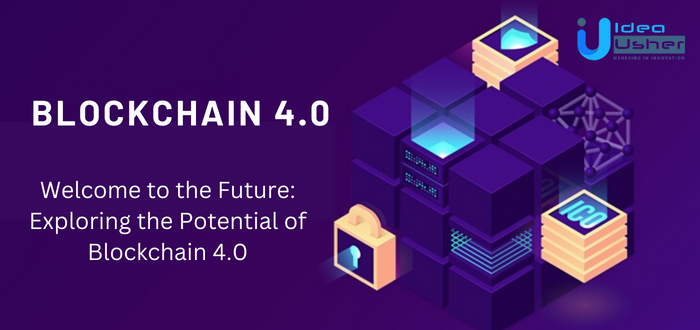Blockchain technology has revolutionized how we conduct transactions, share data, and store information. What was initially introduced as the underlying technology for Bitcoin has evolved to become a powerful tool applicable across multiple industries, including healthcare, supply chain, finance, and logistics. In this article, we will explore the impact of blockchain technology and its various generations.
A discussion of Blockchain evolution is crucial for startups and businesses as the technology matures and gains popularity since it enables them to comprehend their own digital transformation journey and to understand where they are in a future where Blockchain technology will be used. Do they already have a plan, or are they only piloting or taking the initiative in reaction to Blockchain advancements?
The different iterations & types of Blockchain, in particular version 4.0, are the subject of this analysis. It involves discovering the features, appearance, and applications of the fourth generation of Blockchain.
The Evolution of Blockchain Technology
Here are some key takeaways on how blockchain is evolved in recent times.
Blockchain 1.0 – Cryptocurrencies
Although blockchain technology has been present for more than ten years, the launch of Bitcoin signaled the start of a revolution that would alter the financial landscape as we know it. Blockchain 1.0, or the initial generation of blockchain technology, was largely concerned with the development and operation of cryptocurrencies.
Blockchain technology, which first gained prominence with the creation of Bitcoin, is a revolutionary system designed to store and secure transactions on a public ledger. Its sophisticated cryptographic algorithms validate and verify transactions, which are then added to the blockchain permanently and immutably. This ensures that all network participants share an identical copy of the ledger, effectively thwarts fraudulent activities such as double-spending.
It made it possible for people to conduct business directly with one another without the use of middlemen, which rendered banks and other financial institutions unnecessary. It was a desirable choice for people and companies globally since transactions were quick, secure, and affordable.
Blockchain 2.0 – Smart Contracts
One of the most notable advancements brought about by Blockchain 2.0 is the rise of smart contracts.
On the blockchain, smart contracts are computer programs that run independently when specific criteria are satisfied. Smart contracts are self-executing and self-enforcing, unlike regular contracts. Hence there is no need for middlemen to supervise their enforcement. This indicates that they can carry out various tasks without the aid of middlemen, including transaction facilitation, data storage, and other tasks.
The possible uses for smart contracts have significantly increased in recent years. Smart contracts are used in several industries, from real estate transactions to supply chain management, to improve efficiency and cut costs.
A second-generation blockchain is also Ethereum, which is extremely popular. Ethereum is the Blockchain of choice for businesses across industries for powering the functionality of smart contracts, particularly in the supply chain, logistics, and cross-border payments.
Like Bitcoin, Ethereum uses the Proof-of-Work consensus algorithm, which demands the employment of powerful mining equipment and the expenditure of considerable resources.
This led to a demand for more resource-efficient and environmentally friendly blockchains, which the third generation attempted to fill. But since they try to match Ethereum’s programmability, it still stands as the ideal for most of them.
Blockchain 3.0 – DApps
Decentralized apps, or DApps, are a hallmark of blockchain 3.0, commonly referred to as the third generation of blockchain technology. Instead of a centralized server, these applications are peer-to-peer networks built on blockchain.
DApps provide several advantages over conventional centralized applications. They are significantly more secure in the first place since they are based on a decentralized, immutable ledger that is nearly hard to hack or change data on. Since there is no single point of failure because they run on a peer-to-peer network, they are also much more resilient to outages.
DApps are also quite flexible and may be customized to meet the specific needs of various industries and use cases. Decentralized markets for the purchase and sale of products and services can be created using them, as well as decentralized social networks that give users more control over their data.
DApps are more secure, transparent, and adaptive than centralized programs due to their decentralization. DApps are transparent because they are open-source, which enables anyone to check their code and guarantee their integrity.
Blockchain 4.0 – What’s Next?
Blockchains in their third generation are still developing and securing their market positions. Is it too soon to talk about Blockchain 4.0, then?
It is not due to Blockchain’s current rapid advancement. Blockchain technology has moved past the research and testing stages and is currently in the implementation and growth stages.
Blockchain 3.0 mostly concentrates on resolving problems with second-generation blockchains, whereas Blockchain 4.0 focuses on using blockchain to innovate. As firms in various industries use Blockchain at a greater rate, we should anticipate rapid improvements in this area.
Supply chain management, healthcare, and finance are just a few sectors it is expected to transform. It can interface with other blockchains, process more transactions, and provide better security. As this technology advances, it will be intriguing to see how it influences the direction of the digital world.
What Are Some Blockchain 4.0 Applications
It is a new technology that has gained popularity in recent years. This generation of blockchain technology contains substantial advances in scalability, interoperability, and security features, making it more trustworthy and adaptable than its predecessors.
Web 3.0
One of the most significant characteristics of Blockchain 4.0 is its ability to advance Web 3.0. Decentralization, security, and privacy define Web 3.0, the upcoming iteration of the internet. Web 3.0 may materialize with the implementation of technology, offering a more reliable and adaptable infrastructure for various applications.
Blockchain technology is based on a distributed ledger that is not stored on a single server. Instead, the ledger is copied and distributed among numerous nodes, making unwanted access impossible. Blockchain technology, with its decentralized architecture, has the potential to significantly improve internet security and safeguard against data breaches.
Blockchain 4.0 enables users to manage and monetize their own data in any way they see appropriate. People can choose whether to give their data to specific organizations, such as businesses or researchers, in exchange for compensation. By giving users more control over their data, it can contribute to the creation of a society that is more open and equal.
Web 3.0 will rely on decentralized protocols, which Blockchain can supply, to establish an autonomous, open, and intelligent online. There are already some third-generation blockchains designed to support web 3.0. Still, with Blockchain 4.0, we can expect the emergence of more web 3.0-focused chains with cohesive interoperability, automation via smart contracts, seamless integration, and censorship-resistant storage of P2P data files.
Metaverse
Blockchain technology is leveraged to provide consumers with more immersive and engaging metaverse experiences. Using decentralized platforms, users may have more control over their digital assets and interactions.
Blockchain solutions, particularly those expected in Blockchain 4.0, can aid in the regulation of the following Metaverse development requirements:
- Decentralized data management: The metaverse needs decentralized data management to protect the security and privacy of its users. A decentralized and secure data management system that prevents illegal access and user data modification can be provided by blockchain technology, especially those envisaged in Blockchain 4.0.
- Security: Blockchain technologies can significantly improve security in the metaverse, especially predicted ones. Blockchain can guarantee the integrity of user data and stop harmful actions like hacking and fraud by utilizing decentralized systems and cryptographic protocols.
- Digital Proof of Ownership: The metaverse fundamentally needs digital evidence of ownership to guarantee the legitimacy of digital assets. It can offer a decentralized, unchangeable, and tamper-proof ledger that users can use to confirm ownership of digital assets, reducing fraud and boosting the reliability of digital transactions.
- Transfer Value through Crypto: Blockchain-based solutions, particularly those predicted in Blockchain 4.0, can aid in regulating value mobility in the metaverse via cryptocurrencies. By providing a decentralized infrastructure for transactions, blockchain may enable secure, rapid, and transparent value transmission, making it an ideal solution for the burgeoning metaverse economy.
- Interoperability: Interoperability is a key difficulty in the metaverse since users want to move their assets and data smoothly between multiple virtual worlds. Blockchain technology can provide a shared, decentralized architecture for data sharing and interoperability, allowing virtual worlds to connect and trade assets.
- Governance: Blockchain solutions, particularly those expected, can aid in regulating governance in the metaverse. Decentralized systems powered by blockchain can enable transparent and autonomous governance, ensuring that the metaverse operates fairly and securely without relying on central authorities.
Blockchain 4.0 for Business
Blockchain technology has progressed to its fourth generation, also known as Blockchain 4.0. The next generation of blockchain technology is intended to be more scalable, efficient, and secure than previous generations, making it suitable for organizations of all sizes.
Here are some ways that Blockchain 4.0 can benefit businesses:
1. Improved Security
It is a game-changing technology that employs complex encryption technologies and distributed ledgers, and promises to provide organizations with an unparalleled degree of security that is virtually immune to manipulation. Companies may rest easy knowing that their critical data is being held in a highly secure, almost hack-proof way thanks to Blockchain 4.0.
2. Greater Efficiency
Blockchain 4.0 allows businesses to optimize their operations by automating key functions such as contract management, supply chain management, and financial transactions. With new technology, companies can unlock the power of automation to slash the time and costs associated with middlemen and intermediaries while mitigating the risk of costly human errors.
3. Increased Transparency
It can empower businesses with unprecedented levels of transparency and immutability. Through the creation of a secure, unalterable ledger that captures every transaction, Blockchain 4.0 can enable businesses to build trust with their customers, partners, and stakeholders by providing a crystal-clear, auditable record of their activities.
4. New Business Models
It can help businesses unlock new income streams and enter previously untapped areas because to its unique capacity to enable the construction of decentralized apps (dApps) that run independently of any central authority. Companies may utilize the full potential of Blockchain 4.0 to establish whole new business models that break away from the traditional mold by delivering creative, decentralized services.
5. Better Data Management
Blockchain 4.0, with its decentralized and highly secure data storage architecture, enables authorized parties to access and handle data with new levels of safety and efficiency. Companies can reduce the risk of data breaches and guarantee that all data is maintained in accordance with current rules by using the potential of the same.
Blockchain 4.0 has the potential to be a game changer for organizations of all sizes and across a wide range of sectors due to its unique capacity to create safe, efficient, and transparent platforms for conducting transactions and managing operations. As this technology evolves and matures, it is positioned to become a must-have tool for every forward-thinking firm looking to stay competitive and succeed in today’s ever-changing business landscape.
Conclusion
In conclusion, Blockchain 4.0 is set to revolutionize the world of distributed ledgers and beyond. This next generation of blockchain technology offers enhanced security, faster transaction times, and cutting-edge solutions that leverage AI, IoT, and big data analytics to optimize its potential. With its ability to enable secure and efficient supply chains, streamline cross-border payments, and facilitate the development of decentralized finance, Blockchain 4.0 has the potential to transform a wide range of industries.
In addition, Idea Usher offers end-to-end blockchain development services that include building decentralized applications (dApps), creating smart contracts, and conducting security audits to ensure that your blockchain system is secure and robust.
We can provide comprehensive support and guidance for anyone looking to explore the world of blockchain technology.
Build Better Solutions With Idea Usher
Professionals
Projects
FAQ
Q. What is 3rd Gen blockchain?
A. Third-generation blockchain refers to the most recent iteration of blockchain technology, which seeks to overcome prior generations’ shortcomings while also improving performance, scalability, and security.
Q. What are the top 3 Blockchains?
A. The top three blockchains by market capitalization are none other than Bitcoin, Ethereum, and Binance Smart Chain.
Q. What is Blockchain 4.0?
A. Blockchain 4.0 is a concept that anticipates the next stage of blockchain development, emphasizing improved interoperability, privacy, and scalability.












